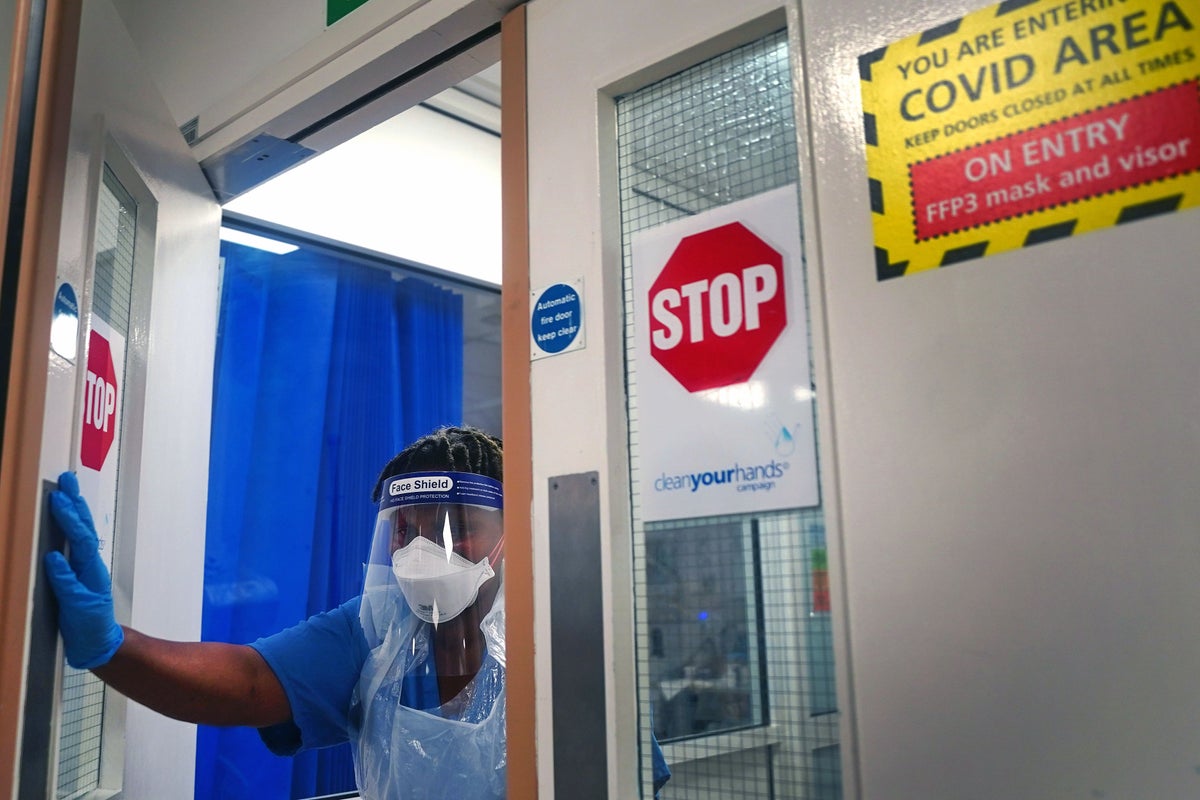
The number of hospital patients in England testing positive for Covid-19 has climbed to a five-month high, in a fresh sign the virus is circulating more widely among the population.
It comes as the NHS continues to roll out the latest Covid booster vaccine, with more than a third of people aged 65 and over in England now estimated to have received a jab.
Health experts have warned to expect “further increases” in Covid-19 as the weather gets colder and people mix more indoors, along with a likely rise in other respiratory viruses such as flu.
There were 4,414 patients in hospital testing positive for Covid-19 as of October 8, according to NHS England.
This is up 14% on the previous week and is the highest total since May 4.
But it is still some way below the level seen during the winter of 2022/23, when the total reached nearly 10,000, and is well below the peak of 34,000 during winter 2020/21.
The rate of Covid-19 hospital admissions in England is also continuing to climb, standing at 6.1 per 100,000 people in the week to October 8, up from 5.7 the previous week and 4.3 a fortnight earlier.
The rate reached 11.4 per 100,000 people over Christmas 2022.
Rates are highest among people aged 85 and over, at 62.7 per 100,000, and 75 to 84-year-olds, at 30.0 per 100,000.
Dr Mary Ramsay, director of public health programmes at the UK Health Security Agency (UKHSA), said: “As we enter the colder months and people begin to mix more indoors, we can expect to see further increases in Covid-19 alongside the usual increases we see in other winter respiratory viruses like flu.
“We are monitoring rates closely and reminding people that when you have respiratory symptoms you should avoid mixing with others, especially those more vulnerable.
“The autumn 2022 Covid-19 booster prevented around 14,400 people having to be hospitalised. This shows clearly the overwhelming benefits for those most vulnerable in getting their Covid-19 jab as soon as possible this autumn.”
The rollout of the latest Covid booster was brought forward as a precaution against the latest Omicron subvariant of Covid-19, BA.2.86, although experts say there is currently no evidence the new strain is more likely to make people seriously ill than other variants in circulation, while vaccination is likely to provide ongoing protection.
The booster jab is being offered to everyone in the UK aged 65 and over, along with care home residents, frontline health and social care staff, those at increased risk because they are pregnant or have a certain underlying health condition, unpaid carers, and household contacts of anyone with a weakened immune system.
An estimated 35.3% of people aged 65 and over in England have now received the jab, UKHSA data shows.
Take-up of the booster is highest among 75 to 79-year-olds (40.6%) and lowest among 65 to 69-year-olds (27.7%).
Dr Ramsay described the figures as “reassuring”, adding that take-up of this year’s flu vaccine had also got off to a “great start, with rates across all at risk groups up on last year”.
She continued: “We strongly urge parents and all those eligible, for either or both Covid-19 and flu vaccines, to book today with the NHS or via their GP surgery as soon as possible.”
There are currently no official estimates of the prevalence of Covid-19 among the UK population, meaning hospital admissions are the only regular guide to possible changes in how the virus is circulating.
Testing for Covid-19 has also been scaled back sharply, so there is not as much data available for analysis.
Infection levels will be monitored this winter under a new study run jointly by the UKHSA and the Office for National Statistics (ONS), however.
It is a scaled-down version of the Covid infection survey that ran for nearly three years and was considered the “gold standard” for measuring prevalence of the virus.
The new study will run from November 2023 to March 2024 and will involve as many as 32,000 lateral flow tests being carried out each week.
Up to 200,000 members of the public will be invited to take part – a smaller number than in the original survey, but the results will be broadly representative of the population as a whole.
As well as estimating the prevalence of Covid-19 in the UK, the study will allow scientists to identify any changes in the rate of infected people being admitted to hospital and assess the potential for increased demand on the NHS.







